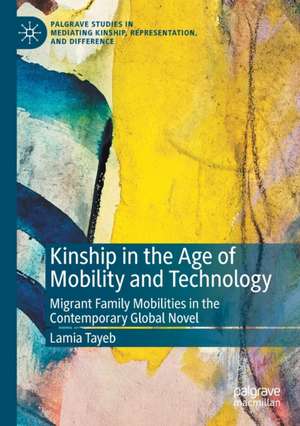Kinship in the Age of Mobility and Technology: Migrant Family Mobilities in the Contemporary Global Novel: Palgrave Studies in Mediating Kinship, Representation, and Difference
Autor Lamia Tayeben Limba Engleză Paperback – 2 mai 2022
| Toate formatele și edițiile | Preț | Express |
|---|---|---|
| Paperback (1) | 691.26 lei 6-8 săpt. | |
| Springer International Publishing – 2 mai 2022 | 691.26 lei 6-8 săpt. | |
| Hardback (1) | 696.50 lei 6-8 săpt. | |
| Springer International Publishing – mai 2021 | 696.50 lei 6-8 săpt. |
Preț: 691.26 lei
Preț vechi: 813.25 lei
-15% Nou
Puncte Express: 1037
Preț estimativ în valută:
132.27€ • 138.39$ • 109.88£
132.27€ • 138.39$ • 109.88£
Carte tipărită la comandă
Livrare economică 03-17 aprilie
Preluare comenzi: 021 569.72.76
Specificații
ISBN-13: 9783030698911
ISBN-10: 3030698912
Ilustrații: X, 204 p.
Dimensiuni: 148 x 210 mm
Greutate: 0.26 kg
Ediția:1st ed. 2021
Editura: Springer International Publishing
Colecția Palgrave Macmillan
Seria Palgrave Studies in Mediating Kinship, Representation, and Difference
Locul publicării:Cham, Switzerland
ISBN-10: 3030698912
Ilustrații: X, 204 p.
Dimensiuni: 148 x 210 mm
Greutate: 0.26 kg
Ediția:1st ed. 2021
Editura: Springer International Publishing
Colecția Palgrave Macmillan
Seria Palgrave Studies in Mediating Kinship, Representation, and Difference
Locul publicării:Cham, Switzerland
Cuprins
Chapter 1. Introduction: Transnational Kinship, Technology and the Global Novel.- Chapter 2. Kinship Transformed: Global Technologies and the Unfettering of Family Ties.- Chapter 3. Born into a Muddle of Relationships: Hanif Kureishi’s The Buddha of Suburbia and Zadie Smith’s White Teeth.- Chapter 4. Between National Diaspora: Monica Ali’s and Jhumpa Lahiri’s Transnational Wives and Families.- Chapter 5. ‘Navigating’ the Planetary Field of Kinship and Family: Khaled Hosseini and Nadia Hashimi.- Chapter 6. Conclusion: Towards a Planetary Field of Kinship and Relation.
Notă biografică
Lamia Tayeb is Assistant Professor of English at the Higher Institute of Human Sciences of Tunis (UTM), Tunisia. She is the author of The Transformation of Political Identity from Commonwealth through Postcolonial Literature: The Cases of Nadine Gordimer, Michael Ondaatje and David Malouf (2006).
Textul de pe ultima copertă
This volume aims to address kinship in the context of global mobility, while studying the effects of technological developments throughout the 20th century on how individuals and communities engage in real or imagined relationships. Using literary representations as a spectrum to examine kinship practices, Lamia Tayeb explores how transnational mobility, bi-culturalism and cosmopolitanism honed, to some extent, the relevant authors’ concerns with the family and wider kinship relations: in these literatures, kinship and the family lose their familiar, taken-for-granted aspect, and yet are still conceived as ‘essential’ spheres of relatedness for uprooted individuals and communities. Tayeb here studies writings by Hanif Kureishi, Zadie Smith, Monica Ali, Jhumpa Lahiri, Khaled Housseini and Nadia Hashimi, working to understand how transnational kinship dynamics operate when moved beyond the traditional notions of the blood relationship, relationship to place and identification with community.
Lamia Tayeb is Assistant Professor of English at the Higher Institute of Human Sciences of Tunis, Tunisia. She is the author of The Transformation of Political Identity from Commonwealth through Postcolonial Literature: The Cases of Nadine Gordimer, Michael Ondaatje and David Malouf (2006).
Caracteristici
Places the transnational family in the context of new kinship studies Explores how technology affects how individuals and communities engage in relationships, both real and imagined Build connections between social sciences (anthropological kinship and family studies, gender studies, migration studies, critical race theory, mobility studies) and the humanities Explores the emerging planetary paradigm in twenty-first-century literature and political thought and the way it informs literary accounts of kinship and the transnational family



